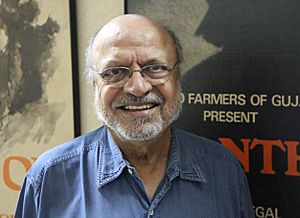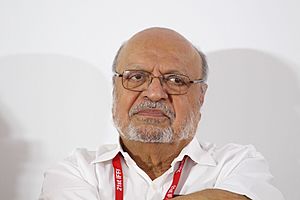Shyam Benegal facts for kids
Quick facts for kids
Shyam Benegal
|
|
|---|---|

Shyam Benegal at his office in Mumbai in 2010
|
|
| Born | 14 December 1934 |
| Died | 23 December 2024 (aged 90) Mumbai, Maharashtra, India
|
| Occupation | Film director, screenwriter |
|
Works
|
Full list |
| Spouse(s) | Nira Benegal |
| Children | 1 |
| Relatives | Guru Dutt (cousin) |
| Awards | 1976 Padma Shri 1991 Padma Bhushan 2005 Dadasaheb Phalke Award 2013 ANR National Award |
| Member of Parliament, Rajya Sabha | |
| In office 16 February 2006 – 15 February 2012 |
|
Shyam Benegal (born 14 December 1934 – died 23 December 2024) was a famous Indian film director and screenwriter. He also made many documentary films. People often see him as a leader in a different kind of Indian cinema called parallel cinema. This style of film was more realistic and artistic than typical Bollywood movies. Many consider him one of the greatest filmmakers after the 1970s.
Benegal received many important awards for his work. These include eighteen National Film Awards and a Filmfare Award. In 2005, he won the Dadasaheb Phalke Award. This is India's highest honor for people in the film industry. The Indian government also honored him with the Padma Shri in 1976 and the Padma Bhushan in 1991. These are high civilian awards given for contributions to the arts. He passed away on 23 December 2024, at the age of 90.
Benegal started his career writing advertisements. He made his first documentary film in 1962. His first four feature films, Ankur (1973), Nishant (1975), Manthan (1976), and Bhumika (1977), helped start a new wave of filmmaking in India. He also made a group of three films called the Muslim Women Trilogy. These films, Mammo (1994), Sardari Begum (1996), and Zubeidaa (2001), all won National Film Awards.
Contents
Early Life and Education
Shyam Sunder Benegal was born on 14 December 1934 in Hyderabad, India. His family spoke Konkani. His father, Sridhar B. Benegal, was a photographer. When Shyam was just twelve years old, he used his father's camera to make his very first film.
He studied Economics at Osmania University in Hyderabad and earned a master's degree. While there, he also helped create the Hyderabad Film Society.
Family Connections
Shyam Benegal was related to another famous film director and actor, Guru Dutt. Their grandmothers were sisters, making them second cousins.
Career in Filmmaking
Starting Out in Films
In 1959, Shyam Benegal began working as a copywriter for an advertising company in Mumbai. He became the creative head there. During this time, he made his first documentary film in Gujarati called Gher Betha Ganga (Ganges at the Doorstep) in 1962. He directed over 900 sponsored documentaries and advertising films during his advertising career.
From 1966 to 1973, Shyam Benegal taught at the Film and Television Institute of India (FTII) in Pune. He also served as the chairman of the institute twice. He made many documentaries, and one of his early ones, A Child of the Streets (1967), was highly praised. Overall, he made more than 70 documentary and short films.
He also received a special fellowship (1970–72) that allowed him to work with children's television workshops in New York and Boston.
Making Feature Films
After returning to Mumbai, Benegal found money to make his first feature film, Ankur (The Seedling), in 1973. This film introduced new actors like Shabana Azmi and Anant Nag. Benegal won an award for the film, and Shabana Azmi won an award for Best Actress.
The success of a new style of Indian cinema in the 1970s was largely due to Shyam Benegal's first four films: Ankur (1973), Nishant (1975), Manthan (1976), and Bhumika (1977). He often used new actors from film schools, such as Naseeruddin Shah, Om Puri, Smita Patil, and Amrish Puri.
His film Manthan (The Churning) (1976) was about helping people in villages. It was set against the story of Gujarat's dairy industry. For this film, over 500,000 farmers in Gujarat each gave a small amount of money to help produce it. When the film was released, many farmers came in trucks to see "their" film, making it a big success.
After making films about rural life, Benegal made Bhumika (The Role) (1977). This film was based on the life of a famous Marathi actress from the 1940s. It showed her journey to find her own identity and deal with challenges.
In the early 1970s, Shyam also made 21 short films for a special TV project for children. He even used some of these children in his feature film Charandas Chor (Charandas the Thief) in 1975, which was based on a classic folk tale.
Films in the 1980s
Unlike many other filmmakers of his time, Benegal often found private support for his movies. He also received help from organizations for films like Manthan and Susman (1987). However, his films did not always get widely released in cinemas.
So, he started directing TV shows. He made popular series like Yatra (1986) for Indian Railways. He also directed Bharat Ek Khoj (1988), a huge 53-episode TV series based on Jawaharlal Nehru's book, Discovery of India. This helped him continue making films when other filmmakers faced money problems. He also served as the Director of the National Film Development Corporation of India from 1980 to 1986.
After his first four successful films, actor Shashi Kapoor supported Benegal. He made Junoon (1978) and Kalyug (1981) for Kapoor. Junoon was a love story set during the Indian Rebellion of 1857. Kalyug was based on the ancient Indian epic Mahabharata. Both films won Filmfare Best Movie Awards.
Shyam Benegal also started making biographical films, which are movies about real people's lives. His first was a documentary about the famous director Satyajit Ray in 1985. He later made films like Sardari Begum (1996) and Zubeidaa (2001).
The 1990s and Beyond
In the 1990s, Shyam Benegal made a group of three films about Indian Muslim women. These were Mammo (1994), Sardari Begum (1996), and Zubeidaa (2001). With Zubeidaa, he worked with mainstream Bollywood actors like Karishma Kapoor and famous music composer A. R. Rahman.
In 1992, he directed Suraj Ka Satvan Ghoda (Seventh Horse of the Sun). This film won a National Film Award in 1993. In 1996, he made The Making of the Mahatma, a film about Mahatma Gandhi's early life. He also made Netaji Subhas Chandra Bose: The Forgotten Hero in 2005, which was an English language film about the Indian freedom fighter. In 1999, he made Samar, which criticized the Indian caste system and won a National Film Award.
Benegal was also the president of the Federation of Film Societies of India. He owned his own film production company called Sahyadri Films.
He wrote three books based on his films: The Churning (1984), Satyajit Ray (1988), and The Marketplace (1989).
Recent Projects
In 2008, his film Welcome to Sajjanpur was released and received a good response. He also directed the political comedy Well Done Abba in 2010.
Benegal also returned to television with Samvidhaan in 2014. This was a 10-part mini-series about how the Indian Constitution was created.
The government of Bangladesh asked Benegal to direct a film about the life of Sheikh Mujibur Rahman, a very important leader in Bangladesh. This film, called Mujib: The Making of a Nation, was released in 2022.
Personal Life
Shyam Benegal was married to Nira Benegal. They had one daughter, Pia Benegal, who works as a costume designer for films.
Death
Shyam Benegal passed away on 23 December 2024, at the age of 90. He died from kidney disease in Mumbai. He is survived by his daughter.
Filmography
Awards and Honours
Shyam Benegal received many awards and honors throughout his career for his amazing contributions to Indian cinema.
| Year | Award Ceremony | Film | Award |
|---|---|---|---|
| 1975 | 20th National Film Awards | Ankur | National Film Award for Second Best Feature Film |
| 1976 | 21st National Film Awards | Nishant | National Film Award for Best Feature Film in Hindi |
| 1977 | 22nd National Film Awards | Manthan | |
| 1978 | 23rd National Film Awards | Bhumika: The Role | National Film Award for Best Screenplay |
| 1979 | 24th National Film Awards | Junoon | National Film Award for Best Feature Film in Hindi |
| 1982 | 27th National Film Awards | Arohan | |
| 2005 | 50th National Film Awards | Overall Contribution to the Indian Cinema | Dadasaheb Phalke Award |
| Netaji Subhas Chandra Bose: The Forgotten Hero | Nargis Dutt Award for Best Feature Film on National Integration | ||
| 2009 | 54th National Film Awards | Well Done Abba | National Film Award for Best Film on Other Social Issues |
- National Film Awards for Films
- 1984: Best Historical Reconstruction for Nehru (Non-Feature Film)
- 1985: Best Biographical Film for Satyajit Ray (Non-Feature Film)
- 1986: Best Director for Trikal (Feature Film)
- 1993: Best Feature Film in Hindi for Suraj Ka Satvan Ghoda
- 1995: Best Feature Film in Hindi for Mammo
- 1996: Best Feature Film in English for The Making of the Mahatma
- 1997: Best Feature Film in Urdu for Sardari Begum
- 1999: Best Feature Film for Samar
- 1999: Best Feature Film on Family Welfare for Hari-Bhari
- 2001: Best Feature Film in Hindi for Zubeidaa
- 2005: Nargis Dutt Award for Best Feature Film on National Integration for Netaji Subhas Chandra Bose: The Forgotten Hero
- 2009: Best Film on Other Social Issues for Well Done Abba
- Other Major Awards
- Filmfare Award: 1980 Best Director for Junoon
- Moscow International Film Festival: 1981 Golden Prize for Kalyug
- All Lights India International Film Festival: 2015 Lifetime Achievement Award
- B. N. Reddy National Award for his contributions to Indian Cinema
Special Honours
- 1970: Homi Bhabha Fellowship (1970–72)
- 1976: Padma Shri (Fourth-highest civilian honor in India)
- 1991: Padma Bhushan (Third-highest civilian honor in India)
- 2013: ANR National Award
See also
 In Spanish: Shyam Benegal para niños
In Spanish: Shyam Benegal para niños
 | Delilah Pierce |
 | Gordon Parks |
 | Augusta Savage |
 | Charles Ethan Porter |


